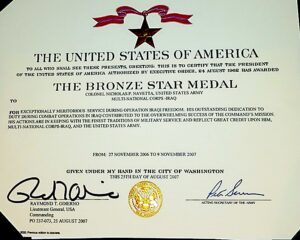
 Colonel Nick Navetta served thirty years in the U.S. Army and retired in 2010 from his last duty position as the Training Division Chief for U.S. Special Operations Command. He is a Veteran of Desert Shield/Desert Storm, Operation Joint Forge in Bosnia, Operation Iraqi Freedom, and Operation Enduring Freedom. Colonel Navetta is branch-qualified in Field Artillery, Combat Military Police, and Civil Affairs. His awards include the Army Achievement Medal with 3 oak leaf clusters, the Army Commendation Medal with 3 oak leaf clusters, the Army Meritorious Service Medal, the Bronze Star Medal, and the Legion of Merit Medal.
Colonel Nick Navetta served thirty years in the U.S. Army and retired in 2010 from his last duty position as the Training Division Chief for U.S. Special Operations Command. He is a Veteran of Desert Shield/Desert Storm, Operation Joint Forge in Bosnia, Operation Iraqi Freedom, and Operation Enduring Freedom. Colonel Navetta is branch-qualified in Field Artillery, Combat Military Police, and Civil Affairs. His awards include the Army Achievement Medal with 3 oak leaf clusters, the Army Commendation Medal with 3 oak leaf clusters, the Army Meritorious Service Medal, the Bronze Star Medal, and the Legion of Merit Medal.
Colonel Navetta’s last combat tour of duty was in Iraq from November 2006 to November 2007, serving as the Senior Liaison Team Chief for Multi-National Corps-Iraq. Prior to that overseas deployment, Colonel Navetta served as the Government Team Chief for a Civil Affairs Command. He received orders to report to III Corps Headquarters at Fort Hood, Texas and was in a large auditorium with the Corps Commander, primary Staff Officers, and unit chains of subsequent Corps Commands to find out more about the mission they were about to take on. The Corps Chief of Staff was briefing the Corps Commander then about the responsibilities of a Liaison Team centered in the U.S. Embassy in Baghdad that would coordinate all U.S. Government agencies/Regional Embassy Offices/ Provincial Reconstruction Teams throughout Iraq, Iraqi host nation Government Ministries/Deputy Prime Minister interactions, and serve as a “ center of influence” for most activities taking place in the Green ( or International) Zone in Baghdad. The Corps Commander asked his Chief of Staff — “Who is this guy that will coordinate all these actions?” The Chief of Staff replied, “Colonel Nick Navetta, Sir”.
With a team of about a dozen Officers, the Liaison Team excelled in their many responsibilities and all members were subsequently awarded the Bronze Star Medal.
There was a 3-month period where 28 friendly forces were killed within the International Zone from incoming enemy rockets and mortars. Colonel Navetta also conducted missions throughout Iraq as well as other countries to include Jordan and Kuwait.
Colonel Navetta was instrumental in setting up the Baghdad Security Plan prior to the U.S. surge of forces under General Petreus and subsequently helping to turn “the tide of battle” during the “Sunni Awakening”. He served as the Corps lead for the Al Anbar II Forum in Ramadi, Iraq where tribal leaders finally sided with U.S. forces to limit the death and destruction that previously went unabated.
In all his combat tours of duty, Colonel Navetta felt that he left each place better than what he found it — or so at that time. It is frustrating nowadays to see that all that hard work and blood spilled seems for naught. It appears that if a population does not yearn for a free society as much as we want it for them, it most likely won’t happen.
